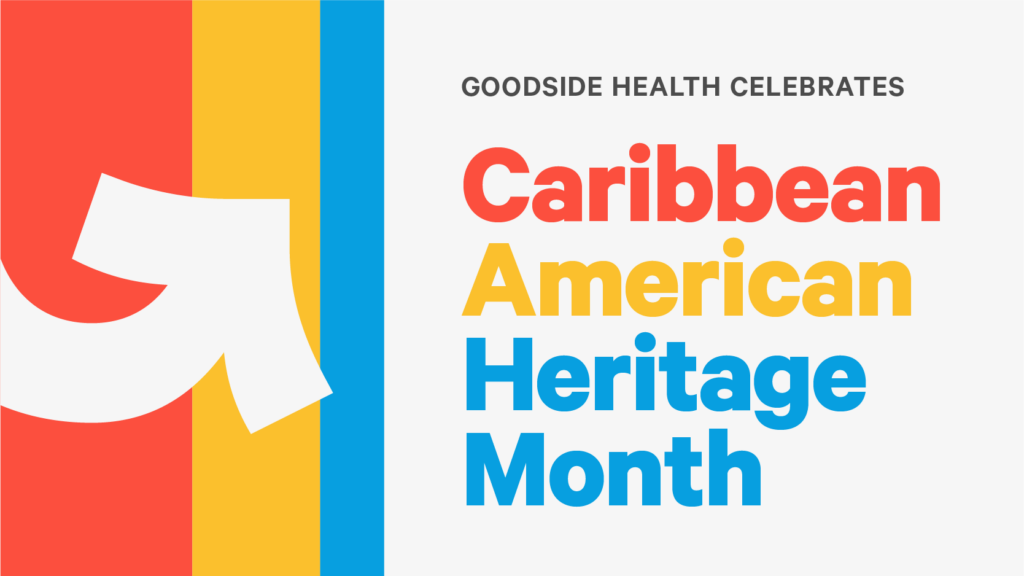Since a 2006 Presidential proclamation, June has been recognized as Caribbean American Heritage Month as we celebrate the contributions of Caribbean Americans to this country, along with their rich culture and heritage.1
Goodside Health is proud to serve more than 1.1 million students through partnerships with our school partners, including in Florida, which is home to 1.6 million of the 4.5 million Caribbean immigrants in the U.S.2
In all, 13 countries and 17 dependent territories make up the Caribbean, and the vast majority of Caribbean immigrants in the U.S. are from Cuba, the Dominican Republic, Jamaica, or Haiti.ibid
Like other immigrant groups, those born in Caribbean countries often face discrimination, identity conflicts, and other challenges when they arrive in the U.S.3
Another of those challenges is a lack of access to culturally appropriate care, specifically around behavioral health, which has been shown to impact development in school-aged children.ibid
Caribbean diets are known to impact children, too. With cultural recipes that feature ingredients often heavy in fats, sugar, and sodium, children of Caribbean descent can be at-risk of experiencing diabetes.4 This may also be a leading driver to the fact that 68% of Afro-Caribbean Americans live with obesity with 32% experiencing high blood pressure.5
More can be done to better learn about the health disparities and outcomes of Caribbean Americans, and some organizations are taking action. Take Nova Southeastern University in Fort Lauderdale, Florida, for example.
NSU Florida has developed a culture-driven campaign around educating Caribbean immigrants on positive healthy nutrition that now has the backing of the Broward County Department of Health.4
Click here to learn more about NSU Florida’s Caribbean Health Initiative.
Goodside Health is committed to serving patients by providing appropriate, quality care that considers the cultural and ethnic backgrounds, lived experiences, and values of every individual. We understand that:
-
Culturally Competent care starts by acknowledging that every racial and ethnic group as well as every person is inherently unique.
-
The way that someone receives, processes, and reacts in a healthcare setting is both rooted in their culture and their own lived experience.
-
‘What is important to you?’ and ‘How can we be helpful?’ are always appropriate questions for the patient and family.
-
Patients and partners trust Goodside Care to care for their families because of our expertise as well as our capacity to adjust recommendations to best meet the patient’s and family’s life circumstances.
Goodside Health is proud to serve a growing number of increasingly diverse communities through our school-based and virtual care services as well as across our Urgent Care for Kids clinics.
Stay tuned to our Good News page as we celebrate important cultural and diversity observances throughout 2023.
About Goodside Health
Goodside Health is advancing the delivery of pediatric care by partnering with communities to provide access to telehealth, mental health, and well-care services at school, at home, and in the clinic. Relentless advocates for expanding access to care and promoting health equity, Goodside Health leverages a Whole-Child Approach to care and lives our mission of closing gaps in children’s healthcare through innovation and execution. To learn more about Goodside Health, please visit goodsidehealth.com.
SOURCES:
-
Caribbean American Heritage. (n.d.). National Archives.
-
Kandel, W., & Parrado, E. A. Caribbean Immigrants in the United States. 2019. Migration Policy Institute.
-
Serdarevic, N., Purnell, D. L., & Samoszuk, M. Mental Health: The Caribbean Immigrant Experience. 2022. Springer Publishing Company.
-
Caribbean Health Initiative. (n.d.). Nova Southeastern University.
-
Heart Disease Risk Profiles Differ Widely Among African Americans, Blacks from the Caribbean, and African immigrants. 2022. American Heart Association EPI | LIFESTYLE 2020 Scientific Sessions – Abstract 08
